
Hong Kong’s Migrant Community


Home is where the heart is: dealing with homesickness
The transformative power of chess
Small Tune Press @ BOOKED
TCK Learning Centre goes global: Taman Cipta Karya Nusantara














Home is where the heart is: dealing with homesickness
The transformative power of chess
Small Tune Press @ BOOKED
TCK Learning Centre goes global: Taman Cipta Karya Nusantara










Oct / Nov ‘24
Editors:
Aileen Alonzo-Hayward & Martin Turner
Lead writer:
Aileen Alonzo-Hayward
Front cover:
Designed by Martin Turner
Design: Martin Turner (based on original template designed by Steve Ellul of Cedar Hong Kong)
Special thanks: Lie Fhung



Community voice: Leo Selomenio (Filipino) Leo’s regular message for the migrant community
TCK Learning Centre goes global! The grand opening of TCKN in Yogjakarta
BOOKED: Hong Kong Art Book Fair Pangyao meets up with Small Tune Press
Home is where the heart is Dealing with homesickness as a migrant worker
Conversation with Ron Ron explores how to manage your emotions
The transformative power of chess Chess community groups FCC-HK and PCCHK
Blinded by love
Our ADCC collaboration discusses romance scams
Consul General Yul Edison
Con Gen Yul’s message for the Indonesian community
Mr. Penyabar by Anggi Kusumadewi (Indonesian)
Our

A very warm welcome to our third anniversary edition of Pangyao magazine!
This issue’s lead story tackles homesickness, with Dr. Nimisha Vandan discussing the difficulties migrants face being away from loved ones, and ways of coping better in an unfamiliar environment; we also speak to Crista Tri Rahayu, Nur Hasanah, and Chris Drake about the newly opened TCKN Foundation Hanoman building and all the good work that they are doing over in Yogyakarta, Indonesia.
We catch up with to two groups connecting the community through the game of chess; the Anti-Deception Coordination Centre warns us about romance scams; and our resident columnist, Ron R. Lacson, shares the importance of stepping back to manage strong emotions.
Enjoy issue 18 and cheers to many more years with all our Pangyaos!
Aileen & Martin
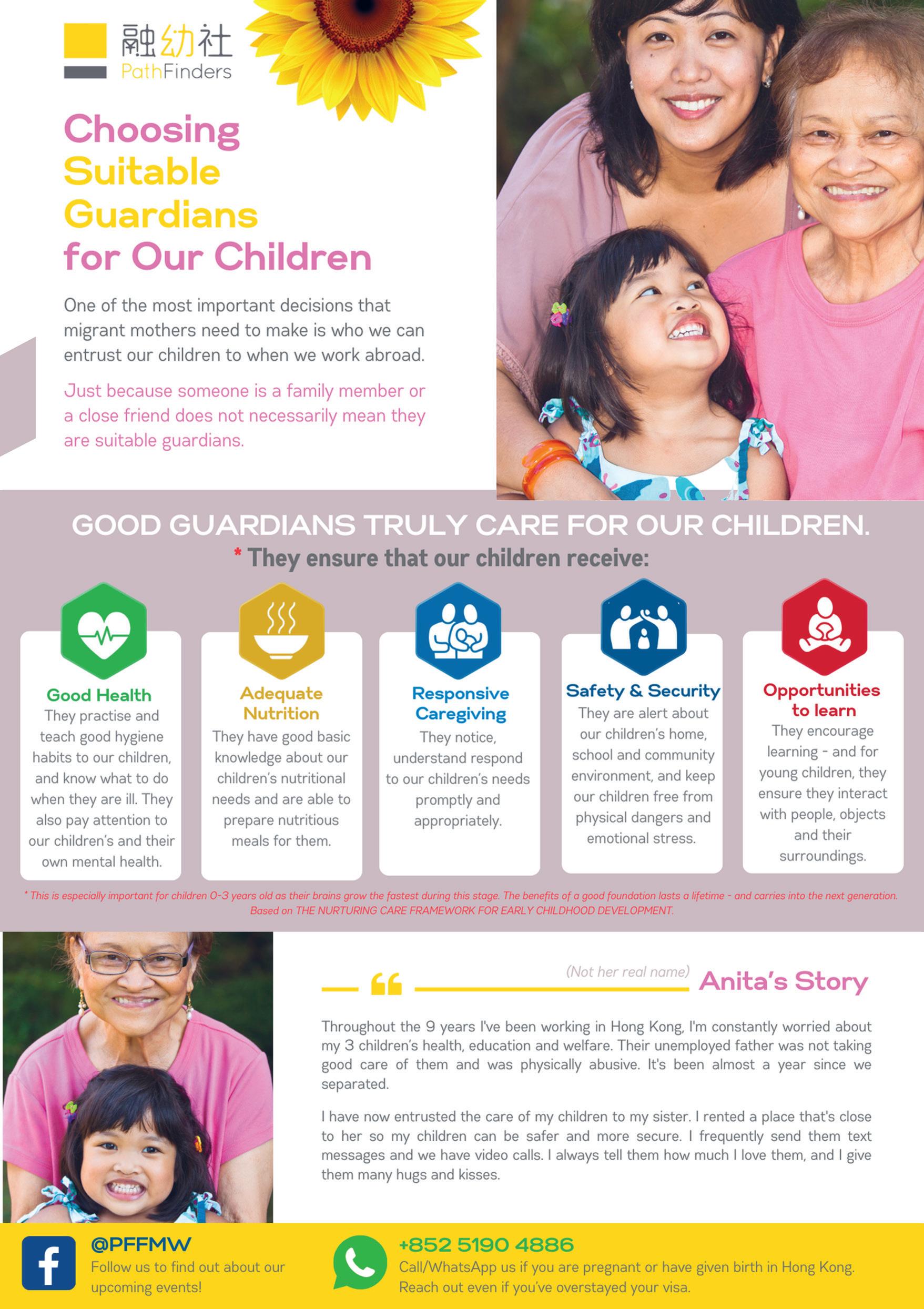
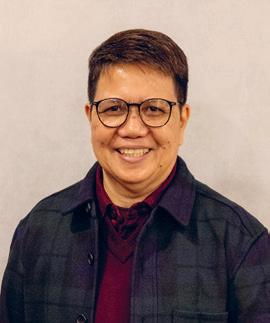

Magandang araw, mga kabayan!
May mga kaibigan ako na nagtatanong sa akin kung may alam ako na mga workshops or seminars na pwede nilang puntahan kapag day-off nila, lagi kong sinasabi na i-check out nila ang Migrants Workers Office (MWO) Facebook page dahil lagi silang may mga seminars, trainings, workshops, at iba pa.
Nitong nakaraan na September 15, may naganap na Personality Development
Training in collaboration with the Naveda Integral Wellness Centre Hong Kong sa MWO-OWWA (Overseas Workers Welfare Administration) training centre na nakafocus sa “style, soul, and self-care”.
Noong September 22 naman, may naganap na Psychosocial Counseling
- Art as Therapy for Stress, mahigit 40 ang lumahok para makinig sa mga
MWO-OWWA Mental Health Providers na mga professional Psychologists, na nagbigay paliwanag sa importansya ng ating mental health.
Bukod pa sa mga collaborations with the Labour Department ng Hong Kong, may mga health check-up and libreng flu vaccinations pa. Every month may regular live podcasts din ang ating
MWO-OWWA Welfare Officer Malou Sumalinog, kung saan nag-aannounce siya ng mga bagong advisories, nagbibigay payo sa mga maiinit na issues, nagpapaliwanag ng mga livelihood programmes, at iba pa.
Suggestion ko din sa mga naghahanap ng magagawa tuwing day-off,


tumingin din sa mga Facebook page ng ibang mga community groups, kasi madalas meron silang iba’t ibang mga activities tulad ng beach clean-ups, sports, Zumba classes, flower making, arts & crafts, chess clubs, dance groups, and many more.
Nandiyan din ang mga nongovernmental organisations (NGOs) tulad ng Pathfinders – na tumutulong sa mga migrant mothers, HELP –nagbibigay payo sa mga migrant workers na may problema, Enrich – nagbibigay ng mga workshops tungkol sa financial literacy, at Uplifters – may mga online education courses. Sila ay may mga ambassador programmes para ma-train din kayo para makatulong din sa ating ibang kababayan na nangangailangan.
Siyempre, huwag kalimutang magbigay din ng oras para sa ating mga sarili. May mga araw na ramdam talaga natin ang ating pagod at stress, ito yung mga day-off na kailangang magrelax, maglakad lakad, at gawin ang mga bagay na nagpapasaya at nakakawala ng stress.
Importante na alagaan natin ang ating sarili, dahil kung maayos ang ating mental and emotional health, mas may maibibigay tayo sa ating trabaho, sa ating mga kaibigan, at sa ating mga mahal sa buhay.









10AM - 10PM DAILY




Don.jaytattoo Hong Kong
Don.JayTattoo Hong Kong
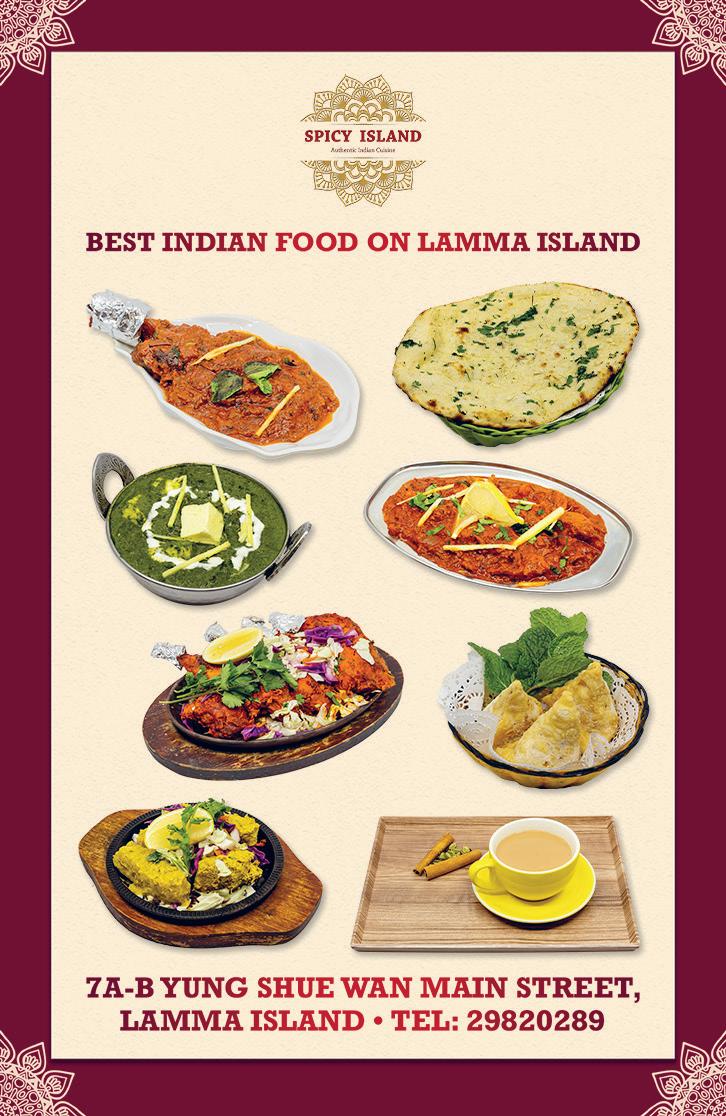



By Aileen Alonzo-Hayward
BACK IN 2011, then migrant domestic worker (MDW) in Hong Kong, Crista Tri Rahayu, had found the lack of education facilities for MDWs frustrating, which motivated her to build on her existing involvement in teaching her peers and co-found TCK Learning Centre for Migrant Workers (TCKLC), an all-volunteer charity that focuses on the educational development and empowerment of migrant women.
Based in Causeway Bay, TCKLC has helped countless MDWs access education while working in the city. Whether learning English or computer literacy, or a new trade like sewing or graphic design, numerous women have improved their futures, and by extension, the lives of their loved ones, back in Indonesia.
Coupled with insufficient government programmes and a lack of financial literacy,
the lives of migrant women are often wrought with challenges when trying to make a living or trying to put their children into good schools back in their home countries. Especially for women who have worked almost all their adult lives abroad, adjusting back to a different standard of living can be hard.
With these obstacles in mind, and also aware of the importance of pre-school education, the idea for Taman Cipta Karya Nusantara (TCKN) was born.
After returning to Indonesia, Crista Tri Rahayu was able to put her Professional Diplomas in Montessori Teacher Education and Business and Communication Skills Management to good use, initially working as a consultant, and a curriculum coordinator for Montessori preschools.

Only a few weeks ago, we had 17 medical students from both Hong Kong University (HKU) and The Chinese University of Hong Kong (CUHK) come over to Indonesia to do medical outreach... I can’t believe how much dedication they had, going to these remote villages with us! - Chris Drake, TCKN Co-Founder
Then in 2021, together with another former migrant worker and TCKLC Co-Founder Chris Drake, she co-founded TCKN Foundation in Yogyakarta and later that year the Foundation opened The Lilliput World in Yogyakarta. With Crista as school Principal, this gave local children the chance to learn and explore in a friendly, open and values-based environment, where they could feel as valued, loved, and understood as they do at home.
Likewise, Nur Hasanah utilised her Bachelor of Arts in English Literature and her Master of Arts in American Studies to work as a freelance English teacher and translator in Indonesia; she has also worked as an education content creator and scriptwriter.
Having experienced first-hand the struggles of adapting back to life in their home
country, Crista was enthusiastic for there to be a centre in Indonesia to help ease the strain of adjusting by lending support, education, and a sense of community for repatriated migrant workers.
The number of people and organisations who wanted to offer assistance was heartwarming. “Only a few weeks ago, we had 17 medical students from both Hong Kong University (HKU) and The Chinese University of Hong Kong (CUHK) come over to Indonesia and visit remote villages to do medical outreach with us,” Chris shares with a smile.
“In partnership with the local Community Health Centre, they conducted various examinations such as blood pressure checks, blood sugar and cholesterol levels, and general health consultations. The students also
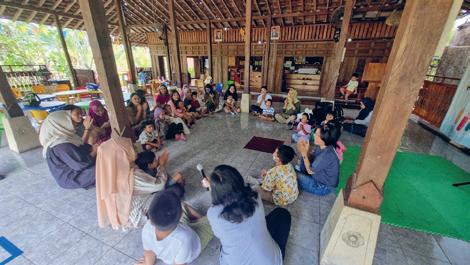
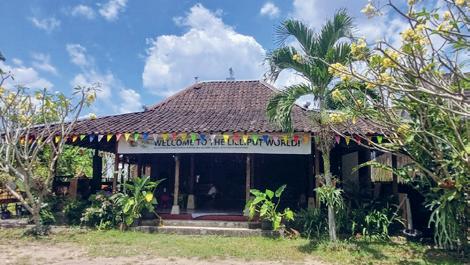

provided education on healthy lifestyles and disease prevention. They explained the importance of maintaining a balanced diet, exercising regularly, and doing routine health checks. This activity not only benefits the community but also provides valuable experience for the students in applying the knowledge they have learned,” says Chris. “I can’t believe how much dedication they had, going to these remote villages with us!” he exclaims.
After more than a year of construction, which began with the groundbreaking ceremony in January 2023, TCKN’s Hanoman Building opened its doors on 8th September 2024, with more than a simple inauguration. The event was a celebration of cultural and spiritual diversity, where interfaith prayers were performed by different religious leaders. Guests were also treated to traditional dances and captivating musical performances.
Each aspect of the celebration highlighted the foundation’s dedication to inclusivity, unity, and the cultural richness it seeks to promote. The opening ceremonies were honoured by the presence of H. GBPH Prabukusumo, S.Psi, HB IX, brother of the Sultan of Yogyakarta, as guest of honour, and other distinguished guests including Mr H. Sarbini, Sariharjo Village Head; Mr Agung Endarto, Ngaglik District Head; and Dr. A. Bambang, Supervisory Board Member of the Foundation, all of whom contributed to the memorable occasion.
The building itself has five functional floors and a rooftop area for a hydroponic garden and solar panels. There are six Montessori classrooms and two classrooms for adult education, alongside a multi-function hall, library, dining room, gym, napping room for toddlers, silent room, and other rooms used for offices, meetings, storage, equipment, and other miscellaneous uses.
“All of our activities interconnect, utilising our resources with a holistic approach to the community. We help migrant women coming back home from Hong Kong; we welcome
enrolling not only their children but also children from our own surrounding village. We offer adult classes and also aim to have a senior centre for the elderly,” shares Crista, Chairperson of TCKN Foundation.
“We also care for the health of not only our students but our neighbouring villages too. Aside from the medical outreach, we also have a Healthy Kitchen where we prepare healthy meals with locally sourced ingredients,” adds Nur, now Head of Community Service Department at TCKN.
As the TCKN team navigate the endless possibilities of their warm and welcoming community abode, they stand testament that with dedicated and passionate people, hard work, and a heartfelt motivation to be of service to those in need, anything is achievable. As Chris says, “We named our building Hanoman – after the monkey deity in the Ramayana –who is the embodiment of courage, devotion, and service. Even though humans are imperfect, we too can help others in need.”


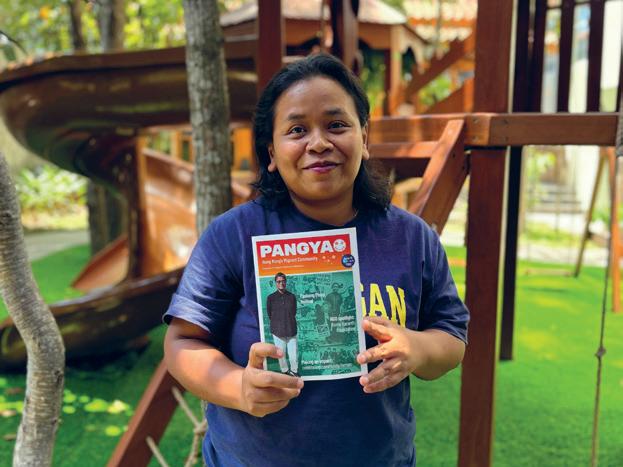



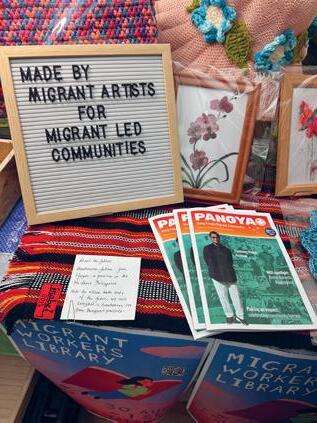



The Migrant Workers’ Library:
FROM 30TH AUGUST – 1ST SEPTEMBER, over 110 local and international publishers, artists, booksellers, and galleries from around the world gathered for the 6th BOOKED: Hong Kong Art Book Fair, held at the JC Contemporary Building in Tai Kwun, Central.
There were numerous live art performances, workshops, talks, and opportunities to meet authors and publishers from all walks of life, and gain insight into the publishing of art books.
“It has been a very busy 3 days and the response from the visitors has been amazing!” exclaims Beatrix Pang, a publisher from Small Tune Press. On display in their booth is an impressive spread of books that feature or are authored by migrants, and most of these publications are included in a specially curated online resource called The Migrant Workers’ Library.
They collect, curate, and present books and zines that showcase authentic narratives and voices – covering all kinds of creative outlets such as personal writings, poetry, photography, and drawings – created by migrant workers, to challenge stereotypes and promote a more diverse, inclusive, and equitable society.
Maria Nemy Lou Rocio of The Migrant Writers of Hong Kong and Leeh Ann Hidalgo of Lensational were also there to help promote their latest collaboration with Small Tune Press, Ingat: An Anthology of Works by Migrant Domestic Worker Creatives in Hong Kong, a collection of creative writing, poetry, photography and visual art by members of their groups (Ingat was earlier featured in issue 15 of Pangyao magazine).
Looking at all the publications and works on the Small Tune Press booth, you can feel the love and care that went into each piece, and how much time and energy was put into everything to be able to share the colourful stories from one of the most vulnerable yet vibrant communities in Hong Kong.

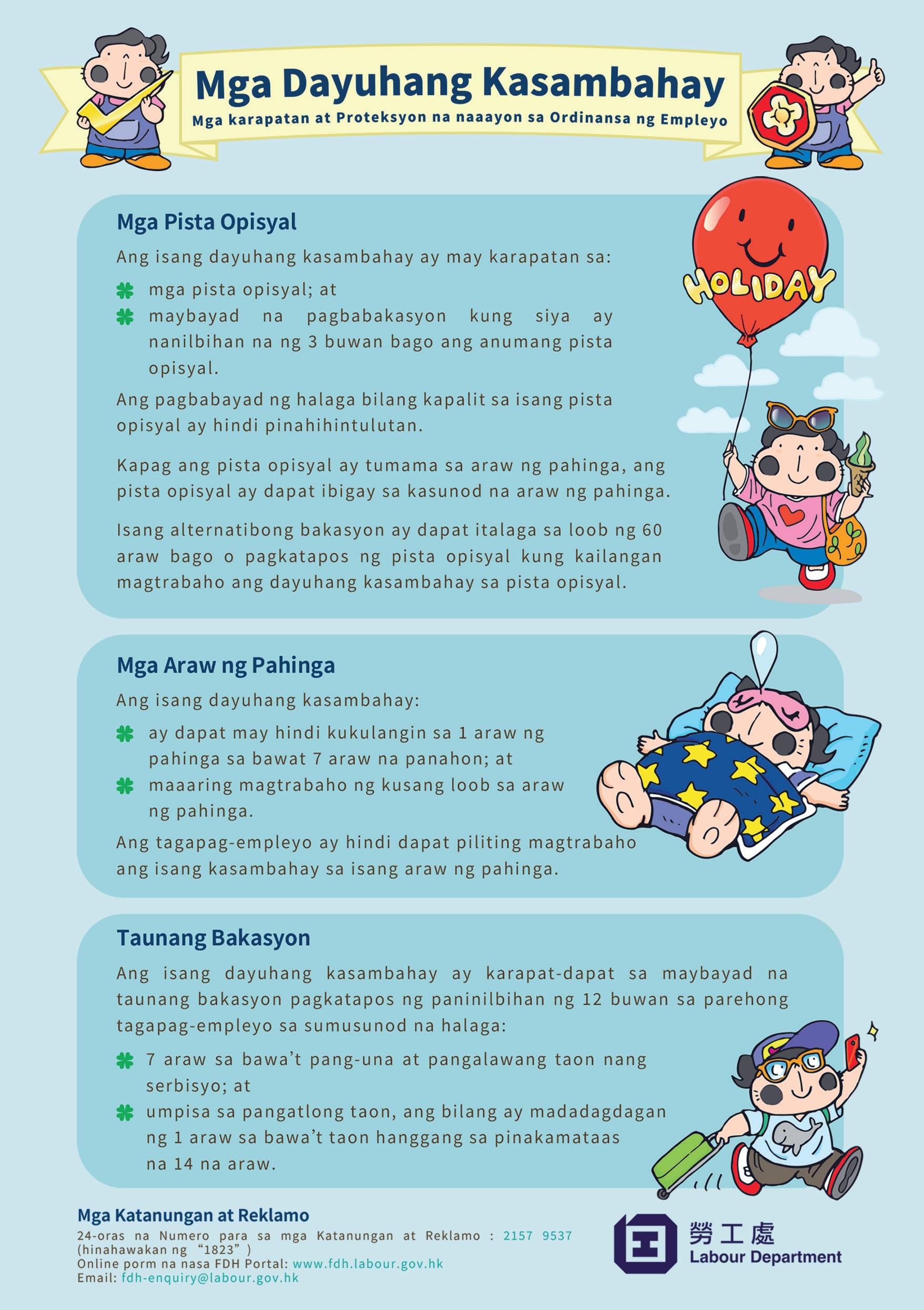







By Aileen Alonzo-Hayward
Longing for home or somewhere familiar is a natural feeling. Humans have been living in communities for as long as we have existed. Safety in numbers, division of duties, group hunting, childminding, storytelling, and many other tasks that our early ancestors depended on for survival have become central to our need to belong – in a community, a family, a home.
In modern times, our need to be close to family, friends, and people we trust brings us comfort, motivation, and connectedness. Migration due to work, study, or conflict can disrupt our carefully curated nest and support system, which in turn can lead to homesickness, sometimes spiralling into anxiety and depression.
“Homesickness is very normal, especially if we have dependents back home. The mother-child bond is one of the strongest familial bonds there is, so when a mother
has to leave her child for work abroad, feeling homesick and sad about being far from home is very normal,” says Dr. Nimisha Vandan, Co-Founder of Okay Minds, a program for emotional first aid, stress management, and the development of emotional intelligence and mental resiliency.
Dr. Vandan explains the cycle of experiencing and adapting to homesickness: “First is culture change or culture shock. This can be a variety of unfamiliar changes in work culture, food culture, or societal culture. If a person is unacquainted with these new surroundings, it can cause feelings of sadness and loneliness.”
Finding yourself in an unfamiliar environment can feel daunting. Being surrounded by a foreign language can also have an impact, especially when confronted with a situation where communication difficulties arise.
“Noong bago lang ako sa aking employer, inaalagaan ko ang nanay niya na matanda. Akala ko lagi syang galit sa akin kasi yung tono ng boses niya at medyo pasigaw. ‘Yun pala, ganon lang si Popo magsalita, hindi naman siya galit. Ngayon, nagbibiruan na kami. Magkasundong makasundo kami,” [When I first started working for my employer, I looked after her elderly mother. I thought she was annoyed with me because of the tone of her voice, as she sometimes talked to me with a raised voice. But this was not the case, this was just Popo’s normal way of speaking, she wasn’t annoyed with me at all. Now, we joke around together. We get on very well] says Melinda, a migrant domestic worker (MDW) who has been working in Hong Kong for more than a year.
Changes in food can also affect homesickness. Whether your home-cooked favourite is sinigang, soto ayam, khichdi, kottu, or pad thai, not eating the dishes you grew up with, or encountering flavours you are unaccustomed to, can add to the feeling of missing home. “I am quite lucky as I can get most ingredients from the Indian shops [in Hong Kong] to make a lot of the food from my hometown,” shares Eudiya Gurung, a Kalimpong, West Bengal native who currently works as a MDW on

Photo by Martin Turner

Lamma Island. “But one thing I really miss is fambi, a dish with jelly-like cubes made from moong dal (mung bean) flour and covered in a lovely chilli sauce! It is a famous street food from my hometown,” says Eudiya.
“Next comes something called the honeymoon period,” Dr. Vandan continues. “This typically happens during the first few weeks of the move or change. You start to explore your new surroundings a bit more and your senses are often overwhelmed, especially in a city like Hong Kong. Everything is new and exciting.”
But after this ‘honeymoon period’, the reality of the distance from family and friends starts to sink in, with this stage also typically giving rise to feelings of sadness and anxiety. It can feel intense, which is why communication with loved ones during this time is essential. This is where the long-distance bonds serve as motivation to persevere.
“Adaptation happens after the period of sadness and anxiety. Employees start to understand their employers better, and vice versa. The initial shock and realisation of being away from home wears off and a sense of purpose strengthens your resolve,” shares Dr. Vandan.
I am quite lucky as I can get most ingredients from the Indian shops [in Hong Kong]... But one thing I really miss is fambi, a dish with jelly-like cubes made from moong dal (mung bean) flour and covered in a lovely chilli sauce!
- Eudiya

Homesickness is very normal, especially if we have dependents back home. The mother-child bond is one of the strongest familial bonds there is, so when a mother has to leave her child for work abroad, feeling homesick and sad about being far from home is very normal
- Dr. Nimisha Vandan, Co-Founder of Okay Minds
When adjusting to a new working environment, difficulties with adaptation can occur if support systems are inadequate. When employees don’t feel a rapport with their employers or colleagues, coupled with the added strain of not being close to loved ones, it can lead to loneliness, anxiety, and even depression.
During her first few months, Melinda also had trouble adapting to her new life in Hong Kong: “Mga dalawang linggo ang nakalipas mula pagdating ko ng Hong Kong nang makaramdam ako ng matinding lungkot at sobrang pagkamiss sa aking anak at asawa. Wala pa akong mga kaibigan dito at sa day-off ko, naglalakad lang ako na walang patutunguhan. Umupo nalang ako sa may park at tinawagan ko ang aking pamilya. Pagkatapos ng aming tawag, umiyak ako ng umiyak.” [Two weeks had passed since I arrived in Hong Kong when I felt a deep sadness and longing for my child and husband. I didn’t have any friends here yet, so when it was time for my day off, I wandered aimlessly. I eventually sat in a park and called up my family. After our call, I cried and cried.]
“Pero paglipas din ng ilang linggo, may mga nakilala ako na mga kapwa Pinoy,
magkakaibigan pa din kami hanggang ngayon. Kapag off namin, magkakasama kami mamasyal o magpahinga. Nagdadala din kami ng mga lutong bahay na pinagsasaluhan namin. Lagi ko ding kausap ang pamilya ko, kaya kahit na mimiss ko sila araw-araw, palagay ang loob ko,” [But after a couple of weeks, I met some fellow Pinoys who I am still good friends with up to this day. On our days off, we hang out, go for walks, or just rest somewhere. We also make home-cooked meals that we share. I call my family often, and even though I miss them every day, my mind is at peace] shares Melinda with a smile.
According to Dr. Vandan, if feelings of sadness persist for more than two weeks, emotional and mental distress can manifest itself in four physical symptoms: too much or too little sleep; binge eating or no appetite; no interest or energy to do things you used to enjoy; and ignoring or severing social connections. If you find yourself experiencing these symptoms, it is time to seek professional help; clinical depression and/or anxiety should be addressed by professionals as medical intervention may be needed.

Fortunately, there are ways you can help to speed up the adaptation process. Here are some strategies to help you cope with homesickness
One of the best ways to combat homesickness is to stay in touch with your family and friends back home. Make regular phone calls, send messages, and video chat with them regularly to maintain a sense of connection. Sharing your experiences, thoughts, and feelings with your loved ones can help you feel less lonely and isolated. Expressing loneliness and sadness can be equally as soothing as sharing joys and triumphs.
Embrace the opportunity to explore your new environment and immerse yourself in the local culture. Take walks around the neighbourhood, visit nearby attractions, and try new foods to experience the unique aspects of your host country. Engaging in new activities can help distract you from feelings of homesickness and broaden your horizons.
Surround yourself with supportive and understanding people in your new environment. Build relationships with coworkers, neighbours, and other migrant workers who can empathise with your situation. Joining one of the many community groups can provide you with a sense of belonging and camaraderie while signing up for some of the numerous workshops and training courses offered through local NGOs and government programmes provide opportunities to learn new skills and meet like-minded individuals. These networks can make it easier to adapt to the challenges of living away from home.
Keep yourself busy with work, hobbies, or social activities to prevent feelings of boredom and loneliness from setting in. Maintaining a routine and staying active can help you stay focused and productive, giving you a sense of purpose and fulfilment. Don’t lose sight of your motivation.
Take care of your physical and emotional wellbeing by prioritising self-care practices. Make time for exercise, healthy meals, and relaxation to keep your body and mind in good shape. Remember, mindfulness, meditation, or yoga to reduce stress and anxiety work best if you also address any underlying issues or feelings you have. As Dr. Vandan reminds us, “Start with addressing these emotions with a positive outlook and behavioural or attitude changes. Sadness and loneliness stem from your mind, and the answer to being resilient also lies in your mind.”
Bring a few personal items from home, such as photos, mementos, or favourite snacks, to make your living space feel more familiar and comforting. Plan your space in a way that reflects your personality and style, so you can create a sense of home wherever you go.
By implementing these strategies and tips, you can effectively deal with homesickness as a migrant worker and make the most of your experience living and working abroad. Remember that homesickness is a temporary feeling that will eventually subside as you adapt to your new surroundings and create a fulfilling life for yourself. Stay positive, stay connected, and stay resilient in the face of homesickness.


Melinda initially found it difficult to adapt to life in Hong Kong and struggled with being far from her family, but she quickly made friends who were able to to relate to her situation. While she still misses home, she has learnt how to manage her emotions and feels her mind is at peace.
Award-winning presenterRTHKPinoyLifeandPangyao resident wordsmith
Ron R. Lacson shares his thoughts

I NEEDED TO go to the washroom. I was on a plane flying from Shanghai to Hong Kong. As I was about to stand, I saw a tall man approaching the front of the aircraft; he attempted to use the lavatory designated for business class passengers. I assumed the crew would stop him, but no one did – even though a flight attendant saw him.
“Oh, they allowed it, probably because they understand the need and are considerate. Puwede pala,” I told myself. Perhaps I’ll do the same then. I waited for the man to return to our economy mansion… I mean, section. I unbuckled my seat belt and headed to the front. I passed by the same flight attendant on the aisle and looked at her.
I tried to discover a glint of approbation in her eyes. I did not see any. Instead, she stopped me: “Sir, where are you going?” she asked. “The washroom,” I replied. “Please remain in your section; those are for business class passengers only,” she quickly responded.
“Can’t you see how I’m walking now? I’m taking small steps to avoid bursting my water bladder!” Alright, I didn’t say that. Although my emotions were starting to build, what I really said was, “Yes, ma’am, I know, but there is a long queue at the back. I’d appreciate it if you’d let me use this one; besides, you already permitted another man in our section to use the loo here.”
IT’S JUST
TAKING US OVER

My future has nothing to do with what I feel today – Ron




I was polite, but she responded as if she had prepared for this scene like an actress ready for her next take. “Sir, stay in your section – we have not allowed anyone from economy to use the business class toilets.”
“I said loo, not toilets. And what did you mean you haven’t allowed anyone? A tall man went there and you said nothing. You’re a liar!” Of course, those were only in my mind again (I didn’t say them). My chest wanted to explode (and my water bladder too).
But then, I realised that it would be useless to argue. The best thing to do was to control my emotions. Rules are rules. I will abide by them, even if some people who apply them choose to bend them for some.
I also had no plan to waste any more time. Getting in line at the back was the best solution to release the tension (and the water) inside me as soon as possible. So, I simply said to the monster… I mean, the lady, “Okay.” Then I walked away and queued. I got hold of my emotions.
Fifteen minutes later, I was back in my seat. I was calm and resting. And it got me thinking, if I’d have let my emotions (anger, vindictiveness, implacability) get the better of me, I could have said some mean words; perhaps things could have even turned ugly.
The flight attendant might have upset me, and I thought she was being unfair, but that was just my conclusion. Besides, what happened was just part of the challenges we all regularly face; it was not worth letting go of all my emotions.
I also realised that I did not know all the facts. What if she was telling the truth? I did not actually see the man opening the door of the front toilets and going in – I just saw him heading there.
Our emotions are part of our lives. We laugh, we cry, and we hold relationships because of emotions. But how do we use our emotions and subordinate them to our thinking?
First, we should know and understand this fact: Emotion has no ability to rationalise, think, apply wisdom, or realise positive actions that can solve problems.
Emotion can get us into trouble if we aren’t aware of this. If we let our emotions control us, we will not realise the full potential of the great person we can be. We are chained to our emotions if we always submit to our feelings.
I am sure we have heard countless stories of people who let themselves fall into bitter fights and conflicts because they could not control themselves.
How many broken families resulted from emotions flying all over the ceilings of a home?
How many people landed in jail because emotions were their masters?
How many have lost their jobs because emotions played vital roles in decision-making?
How many hurtful words have we spoken because we felt upset?
How many actions have we taken and regretted later because our emotions took over?
We are responsible for the results of all our actions. The word ‘responsibility’ is ‘response-ability’ – our ability to respond correctly. A person not controlled by emotions will not blame the circumstances nor fault others if something goes wrong. If we are not careful, and if we are not diligent in understanding how our feelings can influence our actions, then emotions might create a shipwreck in our lives.
Our emotions might also mislead us to think it is alright to shout back, to
retaliate, to say bad words, to cheat back, to lie back, to treat others with disrespect, to deal with people with contempt, or to wish bad things upon the people who wronged us. But is that how we want to remember ourselves years from now? That we were slaves to our emotions? That we were “emotional”?
Daily, we deal with colleagues, bosses, friends, families, strangers, etc. We don’t always fall into smooth and fair situations. But when dealing with these circumstances, we should always think before we do or say anything.
We must use our emotions to trigger us to think. Our feelings are not intended for emotional negativities such as unreasonable anger, fear, anxiety, bitterness, worry, hatred, bullheadedness, spite, or violence.
Our emotions are regular functions of our lives when we respond to something natural. For example, we enjoy good music; we are happy because of a beautiful event; we are sad or angry when something uneventful happens.
Emotions are not normal when they cause us to hurt ourselves or others. Emotions are neither practical nor helpful when they cause us to make or say things we regret.
Emotions should always be subordinate to thinking because emotion does not contain common sense or a set of vocabularies that we can utilise to think and make decisions.
So next time we find ourselves in what we perceive as an unfair situation (and we think that the unfairness is on us), and if that song by the Bee Gees – ‘It’s just emotion that’s taking me over’ – is playing soundly in the corner of our brain, let us always make sure that we stop first and think.













“You can never control how others label you. But only you can see your true value beyond labels. Remember, in chess, a pawn can transform into a Queen!
– Shiela M. Cancino, Founder of Pinoy Chess Community Hong Kong (PCCHK)
CHESS’ EXTENSIVE AND RICH HISTORY can be traced back 1,500 years to the ancient Indian game chaturanga. Since then, it has spread across the globe and is now played, and universally enjoyed, by people from all walks of life. From kings to servants, Grandmasters to schoolchildren, the game of chess has become embedded into the fabric of our society.
Chess is an abstract strategy board game played between two players. Each player controls a total of sixteen chess pieces consisting of six
different types; eight pawns, two rooks, two knights, two bishops, one queen, and one king. Each piece moves differently around the board; the objective is to trap your opponent’s king, signalling the end of the game in a move referred to as ‘checkmate’.
Skills like problem-solving, decision-making, critical thinking, planning, and even creative thinking, are honed in chess, with training and practice known to improve higher-order thinking abilities and overall academic performance.

The Pinoy Chess Community Hong Kong (PCCHK) and the Filipino Chess Club Hong Kong (FCC-HK) are two of the rising stars among chess community groups in Hong Kong. Aside from aiming to enhance their members’ chess skills, both groups also impart a sense of belonging, cultivating camaraderie through challenge, and a shared desire to learn and improve.
PCCHK was founded by Shiela Cancino (pictured bottom-left, opposite page), a Novaliches native who, despite growing up in the shadow of her two sisters, was able to forge her own path in chess with the help of her father, who helped develop her passion for the game.
Shiela left the Philippines in 2007 to work abroad, and through a series of fortunate events and personal decisions, she arrived in Hong Kong in 2010, where she has been working in the finance sector ever since.
“In 2017, Ate Catalina Magno, a veteran leader in Hong Kong (Pinoy Impact Workshops), saw my video as the Huwarang OFW (an annual award for outstanding migrant workers given by the Christian Broadcasting Network). After learning

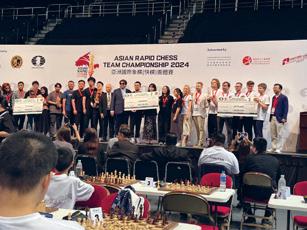
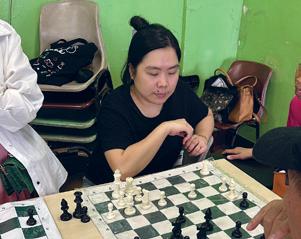
I was a passionate Toastmaster, she asked for my help organising leadership training for our kababayan leaders in Hong Kong,” Sheila says, recalling the initial spark of inspiration that led to her starting her own community.
“[Then in 2023] I recorded a two-minute video inviting Filipinos to learn chess on Sundays. I was so surprised there were so many who were interested! Many of them didn’t know how to play or had little knowledge. Thank you, Batch 1 founding members: Ate Cat, Jaypee, and the officers!” she shares, referring to how PCCHK started.
The Filipino Chess Club Hong Kong official Facebook page has only been around since early September 2024, but according to Edwin Borigas (pictured top-left below, wearing red), an engineer who has been working in Hong Kong for more than 20 years, they started the chess club in 1998, with only 10 people. Now, they have a 400-strong group chat that handles all queries about chess, as well as building and maintaining friendships between members.
After winning the 1996 Hong Kong National Chess Tournament, Edwin has been asked





to represent Hong Kong in various chess tournaments over the years, in different countries around the world. He has competed in Kuwait, Slovenia, Spain, Russia, and more.
With his extensive knowledge of the game and experience competing, Edwin decided to share his skills with his kababayan, by teaching novices the basics and giving them the opportunity to compete in friendly matches with their peers.
recognition. It is about doing something I am passionate about and helping others at the same time,” Edwin shares.
Staying humble in the face of success and achievement seems to be a well-established trait amongst the chairpersons of both PCCHK and FCC-HK. Aside from being a Certified Public Accountant (CPA), Shiela is also an author, public speaker, certified life coach, and most recently, Woman Candidate


LOVING SOMEONE MEANS giving a piece of yourself for that person to keep. You invest your time and effort, hoping to find that special someone to share your hopes and dreams with, and ultimately share your life with.
It is the best feeling, but paradoxically, it can also be the worst. Especially when it comes to broken trust, and, in the face of romance scams, the financial and emotional damage to go with it.
Romance scams have become a growing concern in Hong Kong, especially amongst the migrant community, who are particularly vulnerable to such schemes due to being away from family and friends.
Homesickness (read this issue’s homesickness feature on page 14) and loneliness can bring emotional and mental distress; it may even cloud one’s judgement when it comes to receiving attention from potential scammers online, who often specifically seek out lonely women to woo.
“Mga 15 years na ako na biyuda. Malalaki na din ang aking dalawang anak at may sariling pamilya na din sila. Okay naman akong nagtratrabaho dito sa Hong Kong para na rin sa sarili ko at hindi pa ako handang mag-retire. Nagkaroon ako ng boyfriend dito sa Hong Kong pero nagbreak kami mga 4 years ago. Talagang sobrang lungkot ko noong nangyari ‘yon dahil pakiramdam ko na hindi na ako

makakahanap ng pag-ibig sa edad ko na 53 years old noon,” [I’ve been a widow for 15 years. My two children are all grown up with their own families. I was alright working in Hong Kong for my own sake and I wasn’t ready to retire just yet. I had a boyfriend here, but we broke up 4 years ago. I was very sad when it happened, because I had a feeling that at my age of 53 then, I would never find love again] shares Gina (not her real name), a migrant domestic worker (MDW) who has been working in Hong Kong for many years.
Many migrants come to the city seeking better job opportunities and financial stability, making them more susceptible to offers of financial assistance, even if it sometimes means parting with their own money on a promise of bigger returns.
These scams typically involve perpetrators creating fake online profiles on dating websites or social media platforms, luring unsuspecting individuals into romantic relationships, then asking for money under false pretences.
“March 2021, nagtitingin lang ako sa Facebook ko nang napansin ko ang isang message alert. Galing sa isang lalaking nagngangalang Jeff na isang sundalo sa US Army na nakabase sa Libya. Napakaganda ng message niya. Nakikita niya daw sa aking profile na masipag ako, that I looked like someone who takes care of herself,” [It was March 2021 when I happened to notice a message


on Facebook. It was from a guy from the US Army, he said his name was Jeff and he was stationed in Libya. His message was so nice; he said he could see from my profile that I was hardworking, that I looked like someone who takes care of herself] recalls Gina with a smile.
One of the most common tactics adopted by romance scammers is building a strong emotional connection with their victims. They often use flattering language, love poems, and promises of a future together to manipulate their targets.
“Siyempre noong una, medyo duda ako sa kanya, kahit isang buwan na kaming nagmemessage araw-araw. Kaya tinanong ko si Jeff kung pwede niya akong tawagan para marinig ko ang boses niya. Umoo naman siya, at nag-usap kami ng gabing iyon. Kung gaano siya kalambing sa mga messages niya, ganon din siya habang kausap ko sa telepono. Talagang nahuhulog na ang loob ko sa kanya,” [Of course, in the beginning I had my doubts, even though we had been

messaging every day for a month. So, I asked Jeff if he could give me a call, so I could get a chance to hear his voice; he said yes and called me that night. His conversation over the phone was as sweet and romantic as he was in his messages. I was starting to fall in love with him,” Gina reminisces.
Once trust has been established, the scammer will then fabricate a scenario in which they require financial assistance, such as being stranded in a foreign country without funds or needing money for a medical emergency. Victims, who by that point have become emotionally invested in the relationship, are much more likely to comply with these requests, out of a desire to help their ‘partner’.
“Mga 3 months kaming halos araw-araw nag-uusap sa messenger nang pinakita niya sa akin ang kanyang last will and testament at deposit slip sa isang bangko na nagkakahalaga ng USD 4,800,000. Kailangan daw nya magbayad ng 0.1% (USD 4,800) na fee para ma-access niya ang kanyang deposito. Pahapyaw >
lang niya binanggit, at hindi naman siya nanghingi ng pera sa akin. Binaling niya ang usapan naming sa anong pangarap ko kung magkapera ako, at tutulungan niya daw akong makamit ito. Pakiramdam ko na seryoso siya sa akin kasi sa mga salita niya na susuportahan niya ako,” [After about 3 months of speaking to each other every day, he showed me his last will and testament and a bank deposit certificate, both stating that he had USD 4,800,000 in his account. He told me he needed to pay a 0.1% (USD 4,800) fee for him to access his deposit. He just mentioned it in passing, and didn’t ask me for the money then. He changed the topic and asked me what my dream life would be if I ever had money and told me he would help me achieve this. I really felt he was sincere because of his words of support] Gina sighs.
As with most romance scams, Gina’s story did not end well. She ended up borrowing money from friends and loan companies to send ‘Jeff’ the USD 4,800 (HKD37,360). He tried asking for more money after a few weeks, but Gina said she couldn’t spare anymore and begged him to return some of the money she sent him. That’s when he blocked all forms of communication with her and she was left with the sad truth that, not only had she been scammed, but she had also had her heart broken.
To avoid falling prey to romance scams, we should be vigilant and educate ourselves on the red flags associated with these fraudulent schemes. Some common warning signs to look out for include requests for money early in the relationship and inconsistencies in the scammer’s story.
Be cautious when communicating with individuals who claim to be in a foreign country or have a complicated backstory, as these are often indicators of a potential scam. It is important to remember that genuine romantic partners should never ask for financial assistance from someone they have only just met online.


Of course, in the beginning I had my doubts, even though we had been messaging every day for a month. So, I asked Jeff if he could give me a call, so I could get a chance to hear his voice; he said yes and called me that night. His conversation over the phone was as sweet and romantic as he was in his messages. I was starting to fall in love with him - Gina
Subscribe to scam notifications:


KEJAHATAN PENCUCIAN UANG (money laundering) semakin marak di Hong Kong dalam beberapa bulan terakhir. Laporan Hong Kong Police Force menyatakan bahwa 5.693 orang telah ditangkap atas tuduhan penipuan dan pencucian uang pada enam bulan pertama tahun 2024, atau meningkat 40% dari periode yang sama di tahun sebelumnya. Sebagian besar dari mereka merupakan pemilik rekening bank yang digunakan dalam berbagai kasus pencucian uang.
Pencucian uang merupakan kejahatan yang sangat serius di Hong Kong. Pelaku, maupun mereka yang terbukti terlibat di dalamnya, dapat didakwa hukuman hingga 14 tahun penjara atau denda sebesar HKD 5 juta (setara dengan Rp 10 miliar). Dakwaan juga dapat dikenakan kepada pemilik rekening meski dia tidak tahu menahu pengenai penyalahgunaan rekening tersebut.
Sebagai pendatang di wilayah orang, ayo lindungi diri dan hindari keterlibatan di kasus pencucian uang! Pahami modus kejahatan, serta cara-cara pencegahan dan penanganannya.

@kjrihk

@indonesiainhongkong


Hotline KJRI Hong Kong: 5242 2240
Hotline anti-penipuan kepolisian Hong Kong: 18222
1. Pelaku meminta bantuan menggunakan identitas kita untuk membuka rekening di salah satu bank
2. Pelaku memberi iming-iming untuk meminjam/menyewa/membeli rekening bank kita dengan berbagai alasan
3. Pelaku meminta buku tabungan/ kartu ATM, serta username dan password aplikasi perbankan
1. Waspada terhadap siapapun yang menawarkan cara mendapatkan uang dalam jumlah besar dengan mudah dan cepat
2. Jangan meminjamkan, menyewakan, ataupun memperjualbelikan rekening bank
3. Selalu simpan buku tabungan/kartu ATM di tempat yang aman
4. Jangan memberitahu username dan password aplikasi perbankan kepada orang lain, bahkan kepada pihak yang mengaku dari Bank
1. Laporkan dugaan penyalahgunaan rekening ke bank dan kepolisian terdekat
2. Tutup rekening yang diduga disalahgunakan
3. Lapor ke Anti-scam Hotline di 18222
4. Lapor KJRI Hong Kong melalui loket pengaduan atau hotline

By Anggi Kusumadewi

Sebut saja Mr.X: dari masa muda bekerja di kantor polisi pemerintah sebagai sekretaris inspektur. Sekarang ini ia sedang berjuang di fase akhir – kanker paru-paru stadium 4. Selain itu pun dari kecil sudah ada penyakit polio, separuh badan tidak tumbuh secara normal. Kisah ini berawal dari batuk yang berkepanjangan di awal tahun 2021 di mana Mr.X terserang batuk berdahak yang dikiranya batuk biasa. Malah tidak dirasakannya, kami pun sempat berlibur ke Macau dan di berbagai lokasi wisata di Hong Kong tanpa kami terka bahwa batuknya adalah gejala penyakit yang dapat mematikan. Di selasela berbagai waktu dia juga periksa kesehatannya di beberapa dokter, akan tetapi tidak kunjung membaik. Pada suatu hari ia ke dokter spesialis dan langsung disuruh CT-scan. Dari situ ada yang tampak janggal dan bagian paru-paru kemungkinan yang bermasalah. Untuk lebih jelasnya dokter menyarankan untuk ambil sel yang ada di paru-paru untuk diperiksa lebih lanjut di laboratorium. Dari sini pula semua tertib berjadwal dan harus antri. Saat menunggu waktu istirahat di rumah tidak disangka malam harinya ia batuk-batuk disertai darah begitu banyak dan kental, mau tidak mau harus telpon ambulance.



Malam itu dengan ambulance segera mereka membawa Mr.X ke hospital. Besok harinya dirujuk ke ruang operasi untuk melakukan pengambilan sel di paru-paru dan langsung hari itu juga bisa keluar hasil tes laboratoriumnya. Membuat tercengang dengan perkataan dokter divonis kanker paru-paru stadium 4. Dokter pun mengatakan perkiraan waktu hidup hanya 2 tahun lagi. Mungkin di dalam pikiran Mr.X 2 tahun waktu yang sangat singkat. Dari situlah pikiran tidak stabil karena nyawa terancam, bahkan cinta pun bagaikan terenggut. Mrs.X berubah total; tidak peduli dan hanya mencari kesenangan sendiri. Hari-hari pun penuh pertukaran sehingga keadaan semakin buruk. Untung pelayanan medis negara Hong Kong sangat baik dan berhasil membantu menurunkan level kanker tersebut dari level 33 sekarang turun ke 1,8. Saya bekerja di sini pun merasakan hancurnya hati dan batinnya –saya akui Mr.X orangnya penyabar dengan situasi dan kondisi sekarang.
Waktu pun berjalan. Pengobatan seharga $1000 per butir pun sudah tidak mempan. Suntik tulang seharga $21,000 per suntikan pun sudah tidak ada efeknya. Satu-satunya cara hanya kemoterapi yang ditempuh sebagai metode terakhir, yang kini sudah melewati bulan ke-9. Muncul penyebaran baru kanker di rahang bawah kirinya yang membuat turunnya nafsu makan secara drastis dan membuat pikiran kacau. Ke dokter pun tidak ada penanganan selain menunggu hasil pengobatan kemoterapi. Di situlah Mr.X pasrah dengan keadaannya. Kerap kali ia melamun dan banyak diam. Anak dan ke dua cucunya menjadi hiburannya. Walaupun jauh di Australia, mereka kerap melakukan video call, meng-update kondisinya. Kabarnya mereka sudah pesan tiket untuk menjenguknya. Mungkin hati Mr.X agak damai mendengarnya. Tiap hari melihat vidio kiriman dari anaknya, ia tersenyum dan kadang terbahak-bahak melihat tingkah cucunya yang masih bayi
Dari sini banyak hal yang
aku petik dan kujadikan pelajaran pengalaman hidup: supaya kita lebih bersyukur dengan keadaan apa pun itu
sedang lucu-lucunya. Aktifitas sehariannya menghabiskan waktu di sofa melihat TV dan YouTube tentang penjabaran kanker paru-paru dan banyak pengetahuan bagaimana menyikapinya. Penjelasan beberapa dokter di sosmed itu mungkin membantu menguatkan mentalnya. Ia sudah tidak mengharapkan Mrs.X untuk mengobati luka batinnya yang sudah amat sangat dalam. Mungkin takdir dari Tuhan untuk melewati rintangan yang amat besar. Untungnya keadaan finansial mapan, maka Mr.X lebih agak ringan menjalani kehidupan dengan kondisi yang tidak sehat jasmani dan tekanan batin cintanya. Dari sini banyak hal yang aku petik dan kujadikan pelajaran pengalaman hidup: supaya kita lebih bersyukur dengan keadaan apa pun itu. Hidup mati sehat sakit rezeki semuanya hanya milik Tuhan.
Sungguh keajaiban menurutku: dari vonis umur hanya 2 tahun sekarang sudah hampir 3 tahun bertahan. Pengorbanan jiwa raga mental, semuanya diuji. Dengan fondasi jiwa penyabar tidak mengeluh ke siapa pun, semoga ada keajaiban lagi supaya Mr.X dipanjangkan umurnya.

Emergency Hotline (Police, Fire, Ambulance) 999
Police Hotline 2527 7177
Anti-Deception Coordination Centre 18222
HK Government departments & agencies
Hong Kong Immigration Department 2824 6111
Hong Kong Labour Department 2157 9537
Consumer Council 2929 2222
Consular services
Consulate General of the Philippines in Hong Kong 2823 8500
Overseas Workers Welfare Administration (OWWA) 6345 9324
Philippine Overseas Labor Office (POLO) 2866 0640
Consulate General of the Republic of Indonesia in Hong Kong 5242 2240
Royal Thai Consulate General in Hong Kong 2521 6481
Consulate General of India, Hong Kong 3970 9900
Consulate General of Pakistan, Hong Kong 2827 0681
Consulate General of Nepal, Hong Kong 2369 7813
Non-Governmental Organisations
International Social Service Hong Kong (ISS) 2834 6863
HELP for Domestic Workers 2523 4020
Pathfinders (Hotline for Migrant Workers) 5190 4886
Christian Action Centre for Migrant Domestic Workers 2382 3339
Association Concerning Sexual Violence Against Women (RainLily) 2375 5322
Bethune House Migrant Women’s Refuge 9338 0035
Association of Indonesian Migrant Workers in Hong Kong (ATKI-HK) 9587 8317
Mission for Migrant Workers 2522 8264
Refugee Union 9828 7176
The Samaritans Hong Kong 2896 0000
Enrich HK 2386 5811
Uplifters 9731 9713
TCK Learning Centre for Migrant Workers 9344 4459
The Zubin Foundation 2540 9588
Equal Opportunities Commission (General Enquiry Hotline) 2511 8211
Equal Opportunities Commission (Anti-Sexual Harassment Hotline) 2106 2222
Mind HK 3643 0869
ImpactHK 2448 0011
Mesh (Mission for Ethnic Minorities’ Sexual Health) 5226 8547
Branches of Hope 3527 6048
Helpology 5699 6164
Other useful contacts
Hong Kong International Airport 2181 8888



